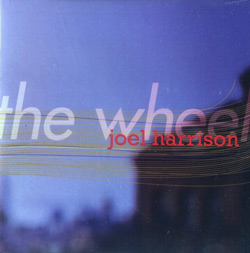The challenge to bring the discipline of the classical world together with the freedom of the jazz world is one with which composers have struggled with mightily. With classical music usually so heavily scored as to dissuade improvisation and jazz so freewheeling as to prevent thorough composition, only a few have managed to break through to combine the genre successfully: Duke Ellington, Charles Mingus and Gunther Schuller's Third Stream come to mind. On "The Wheel," jazz guitarist/composer Joel Harrison presents a five movement suite for double quartet and guitar, with the double quartet consisting of a string quartet and a jazz quartet featuring David Binney on alto sax, Ralph Alessi on trumpet/Flugelhorn, Lindsay Horner on bass and Dan Weiss on drums.
As Harrison explains, he began this project by "writing string quartet music with Appalachian, African and modern classical sensibilities." The Bard College composition and performance graduate has been awarded several grants for his classical compositions and is also highly-regarded for his interesting projects in jazz and a wide range of other musical areas.
"American Farewell" starts things off and sounds like Aaron Copland meeting Charles Ives. When Dan Weiss comes in on the high-hat, it is reminiscent of another jazz/strings combination, the opening number "I'm Late, I'm Late" (based on Bartok by composer Eddie Sauter) on Stan Getz' "Focus," where Roy Haynes' drumming sets the frenzied tone. This energetic tune features the violinists fiddling like it's a Walpurgis Night in Appalachia, joined by David Binney and Ralph Alessiís zealous horns.
"Blues Circle" follows and is an engaging merger of polyrhythmic West African guitar, modern string music and straight-ahead, bluesy jazz, with Alessi blowing a mean trumpet, and Binney providing his usual stellar flights on alto. "Rising" meanwhile is a complex piece consisting of rising spirals of unison lines of varying length into an ever-morphing middle section filled with rhythmic breaks and modern intervals. This is interesting and exciting music, which Harrison describes as sounding somewhat like French composer Oliver Messiaen and Weather Report. Binney again charms with a sparkling solo, while Weiss is a propulsive force underneath the swirling, jabbing strings.
Movement Four is titled "We Have Been the Victims of a Broken Promise" from Dr. Martin Luther King's "Letter From a Birmingham Jail" and is a beautiful, bittersweetly melodic acoustic guitar-based composition, with Lindsay Hornerís acoustic bass solo a highlight. The string quartet (violinists Todd Reynolds and Chris Howes, violist Caleb Burhans and cellist Wendy Sutter) deserves credit for their work on these demanding pieces and they truly shimmer here when given the opportunity to play in a more traditional and romantic setting.
"Ceaseless Motion (Watch the future Roll By)" lives up to its title and presents the feel of almost unstoppable motion, with horns, strings, bass and drums all akimbo. Binney cuts loose with another inventive solo (is there a more original alto player out there?). This composition emits so much energy, I would suggest even heavy metal rock musicians would be impressed.
An additional piece - "In Memoriam: Dana Brayton" is a tribute to Harrison friend, the composer Brayton, who passed away far too young. The composition reminds me a bit of Romanian composer George Enescu, but the slide guitar riffs are all Harrison (Brayton was said to have loved Harrisonís bluesy slide playing).
A truly circular recording, even including the additional "Brayton" piece, I was listening to this on my car stereo and was shocked by how seamlessly the album flowed from the ending of the last tune back into the beginning of the first piece. For jazz and classical fans alike, Harrison's "The Wheel" is a compelling blend of the respective styles, along with folk and African music, into an all-encompassing sound.

